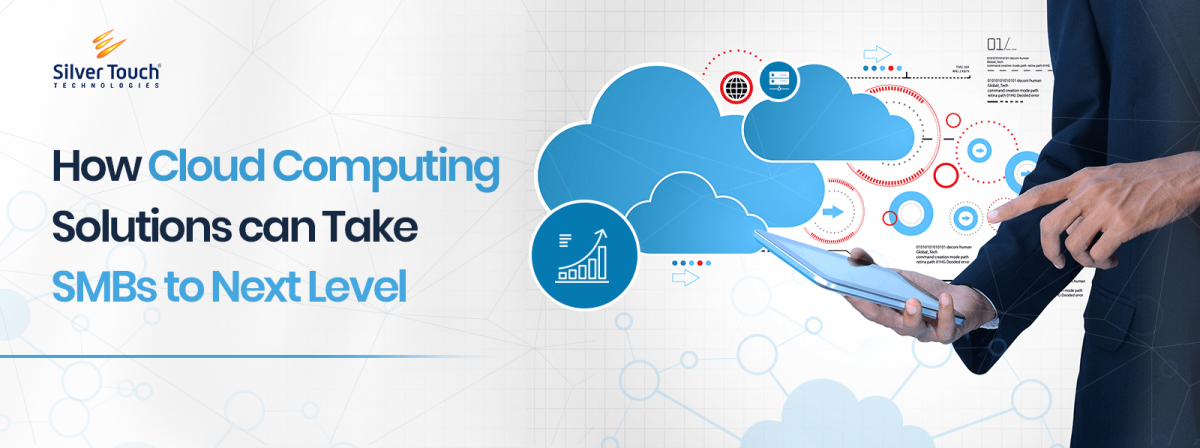Entrepreneurs are well aware of the fact that the digital transformation of business becomes more imperative in this technology-driven age. The cloud computing solutions are here to facilitate the transformation by providing the cloud platform for secure storage and anytime access to critical data and applications. As per the finding of Logic Monitor’s Cloud Vision 2020 survey, 83% of enterprise workloads will remain in the cloud by the year 2020.
How cloud services are Useful for Modern Businesses?
Modern enterprises have to deal with ever-growing competition and diverse requirements that keep on changing with the market trends. The cloud technology with its three platforms- Public Cloud, Private Cloud, and Hybrid cloud- can address both these objectives easily. From email services to data storage services to mobile application access, cloud services can meet the day-to-day needs of businesses in a secure and cost-effective way.
Scalability and flexibility make cloud computing solutions more useful for modern business. When it comes to simplify critical processes and accelerate the speed of implementation on a large scale, Hyper-Converged Infrastructure (HCI) platforms can lend a helping hand with the private cloud. If companies are in search of cost-effective solutions for managing and maintaining the data and workloads, then the public cloud can remain handy.
Hybrid cloud offers facilities like archiving and data storage facilities, disaster recovery, and implementation of new software-based environments. Companies that don’t find the best solution for all applications and workload in one cloud can opt for multicloud (multiple clouds together) to get the most suitable solution for every process. IDG has stated that the multicloud concept offers various cloud options and enables businesses to get faster disaster recovery.
Seven Benefits of Cloud Computing Solutions for Small and Mid-size BusinessesGlobally, many SMBs have started migrating to the cloud gradually. Here are some noteworthy reasons why small companies should opt for cloud services.
1. Offer Cost-effectiveness
This is the first and foremost benefit of cloud technology. Startups and small businesses have budgetary limitations and they simply cannot afford to buy hardware and other necessary equipment for managing business activities. Migration to the cloud removes capital expenditure related to the installation and maintenance of the digital infrastructure.
Also, cloud services can enable small business to get a faster and higher ROI (Return on Investment). In a way, migration to the cloud remains a cost-effective option for small companies.
2. Reduced TTM (Time to Market)Cloud services facilitate small enterprises to allocate resources and implement changes quickly. What’s more, companies can readily implement a new production environment to stay firm amid growing competition. Small businesses can expand their capacities with ease as they have no need to worry about capacity requirements. It reflects in faster production and reduced time to market. Maximizing uptime with minimal efforts is possible with the help of cloud-based solutions.
3. Increase ScalabilityData centers are capable of storing zillions of data spread across various organizations. Generally, SMBs and even large enterprises also face the difficulty of storing and accessing the company data as they expand their business. Also, many entrepreneurs fail to estimate the data storage requirements that result in the reducing ability to grab new opportunities. There, cloud-based resources are very helpful as they can be scaled up and down easily to meet the diverse data storage requirements.
Also Read- How Cloud Platform should Implement Information Security for Business
4. Enhance ProductivitySmall businesses and startups have to deal with limited resources. It is beneficial for them if the cloud service provider can handle data-related requirements. You can keep your team free from maintaining hardware and other devices. As a result, the team can focus on other critical and value-added activities including data analytics, IT security, and product manufacturing. You can assign complex and time-bound tasks to the employees to enhance productivity.
5. Promote InnovationCreativity and innovation hold a key to success for startups and small business. Cloud computing solutions enable the small business to offload tasks related to digital infrastructure management and motivate team members to think innovatively to drive the company. When your team has to focus only on the growth of your company, you can expect the optimum outcome. In a way, cloud technology promotes innovation for modern business.
6. Provide Higher Security
Growing incidences of a data breach and cyberattacks is a big cause of concern for SMBs and established enterprises alike. When it comes to secure your company’s critical data, you can count on cloud services. Third-party cloud platforms of Amazon and Microsoft are known for offering 24/7 security to the company’s data. A robust and reliable cloud services provider company has cloud security professionals who look after the security of confidential data with the help of the latest tools and best practices for control.
7. Improve PerformanceLocal edge computing, improved collaboration, anytime access to data, and high-performance computing are mainstays of cloud computing solutions. The cloud technology can enable the small business to bring automation and reduce latency to improve the overall performance. Also, regular updates in security and performance of data centers also enable companies to keep their data in safer condition and more organized way. With the range of benefits in productivity, collaboration, and security, small businesses can have a competitive edge through cloud computing solutions. Top players like Microsoft and Amazon provide top-notch cloud solutions to meet the needs of modern businesses efficiently. As a startup owner or an entrepreneur of a small company, you can consult a reputed cloud solutions provider to avail the advantage of cloud technology.
Concluding LinesThere is a notion in the corporate world that the cloud setup is difficult and can disrupt daily business activities for the time being. But the reality is- an experienced cloud solutions provider can readily establish and manage the cloud environment on behalf of your business. This is the best way to give your business the advantage of cloud technology. It is fair to mention that the cloud concept can take the business of any size and scale to the next level by improving convenience and increasing productivity.
At Silver Touch, we ensure secure and seamless access to your digital infrastructure and applications in the cloud platform. With an advanced hyper-converged setup, extensive support, superior control, and unbreachable security, your business system can be conveniently accessed anytime, anywhere. If you want to migrate multiple applications and digital processes to the cloud, simply send us an email at info@silvertouch.com. Our expert business consultants will contact you shortly.







